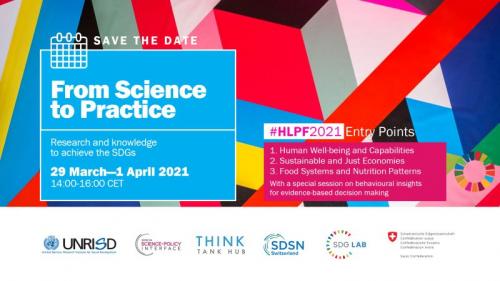
https://www.unrisd.org/80256B3C005BD6AB/(httpEvents)/27A839F5FA046E4C802586700047D6FF?OpenDocument
Date: 29 Mar - 1 Apr 2021
- Time: 14:00-16:00 CET
- Location: Global; online
- Donor(s): Swiss Federal Department of Foreign Affairs (FDFA)
- Counterpart(s): Geneva Science-Policy Interface (GSPI), Think Tank Hub, Sustainable Development Solutions Network (SDSN) Switzerland, SDG Lab
- Project Title: From Science To Practice: Research And Knowledge To Achieve The SDGs
Transforming research and knowledge into progress on the Sustainable Development Goals
Last autumn several partners from International Geneva created a new channel through which research and knowledge from the local ecosystem can amplify its impact on global policy making.
Our Evidence Boxes collected contributions on three key themes for the acceleration and success of progress on the global goals:
Human well-being and capabilities; Sustainable and just economies; and Food systems and nutrition patterns. Respondents also shared their experience with science-policy-practice interactions. Many types of evidence were received, from peer-reviewed studies and review articles to case studies and stories, covering the local, national, regional and global levels.
Our team is now synthesizing the evidence submitted into papers on these themes. They are also looking at where the new information stands in relation to the currently understood state-of-the-art knowledge. Does it confirm existing trends, or offer a different picture?
Why not join us for this open consultation to find out? We’d like to share the findings with you, and get your feedback as well. The papers will then be revised in the light of the meeting conversations, and prepared for distribution and discussion by policy decision makers at the High-Level Political Forum in New York (or HLPF, the main UN body reviewing progress on the SDGs).
Human Well-Being and Capabilities
29 March
14:00-16:00 CET
Good health, clean environments, freedom from poverty and protection from discrimination—enabled by strong democratic institutions and peaceful societies—are essential for realizing the capabilities of all people. Achieving this vision as set out in the 2030 Agenda will require an integrated, evidence-based and interdisciplinary approach. This report on human well-being and capabilities harnesses research from International Geneva to support this global effort.
- Sophie Plagerson
Independent Consultant - Patricio Cuevas-Parra
World Vision International - Paola Ballon
Smith School of Enterprise and the Environment, Oxford University - Thomas Biersteker
The Graduate Institute
✏️ With a workshop segment facilitated by Maria Isabelle Wieser, Think Tank Hub Geneva, foraus
Sustainable and Just Economies
30 March
14:00-16:00 CET
Economic systems that promote an equitable distribution of benefits to the whole population—regardless of gender, race, ethnicity, sexual orientation, religion, age, citizenship status, or any other characteristic—and growth that preserves rather than profits off of the natural environment, are essential for building a more just, more sustainable world. This report draws on research from International Geneva to explore how to build sustainable and just economies, providing evidence-based recommendations for policy makers.
- Joachim Monkelbaan
Quaker United Nations Office (QUNO) in Geneva - Denison Jayasooria
Asian Solidarity Economy Council (ASEC) - Marianna Leite
Human Rights Centre, Faculty of Law - University of Coimbra - Raymond Saner
Centre for Socio-Eco-Nomic Development (CSEND)
✏️ With a workshop segment facilitated by Kali Taylor, SDG Lab
Food Systems and Nutrition Patterns
31 March
14:00-16:00 CET
Ending hunger and malnutrition requires a transition to a sustainable global food system that minimizes environmental impacts, is resilient to shocks, and ensures all people equal access to a healthy diet, now and in the future. This report on food systems and nutrition patters harnesses research from International Geneva in order to inform policy decisions towards this objective.
- Neetu Choudhary
Amity University Patna (India), Arizona State University - Kiah Smith
The University of Queensland - Mary Ng’endo Kanui
International Rice Research Institute - Ahmad Mukhtar
FAO
✏️ With a workshop segment facilitated by Jorge Tamayo, SDSN Switzerland
Towards 2030: Navigating Complexity and Information Overload in Decision Making
1 April
14:00-16:00 CET
In 2020, more than 100,000 academic articles were published on Covid-19. The public, the media and civil society also covered the issue. Yet, international and national decision makers need to make decisions under time constraints and uncertainty. The problem is not just the speed of knowledge synthesis, it is also about how decision makers deal with the uncertainty that comes with such stressful situations. In this session, participants will learn about the current knowledge on how best to navigate complexity and information overload, based on behavioural insights to strengthen decision making.
- Nicolas Seidler
Geneva Science-Policy Interface (GSPI) - Chiara Varazzani
OECD - Maxime Stauffer
Geneva Science-Policy Interface (GSPI) - Jill Rutter
Institute for Government, United Kingdom - David Mair
European Commission's Joint Research Centre - Moira Faul
NORRAG










Add new comment